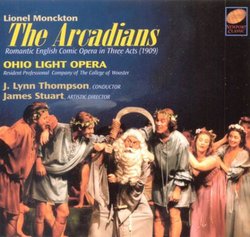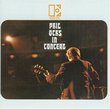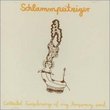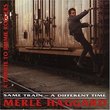| All Artists: Lionel Monckton, Ohio Light Opera Orchestra, John Miller, Buck Hujabre, Caroline Taylor, Amy Warchol, Suzanne Woods, Julie Wright, Daniel Neer Title: Lionel Monckton: The Arcadians Members Wishing: 0 Total Copies: 0 Label: Newport Classic Release Date: 6/15/1999 Genre: Classical Style: Opera & Classical Vocal Number of Discs: 2 SwapaCD Credits: 2 UPC: 032466566523 |
Search - Lionel Monckton, Ohio Light Opera Orchestra, John Miller :: Lionel Monckton: The Arcadians
 | Lionel Monckton, Ohio Light Opera Orchestra, John Miller Lionel Monckton: The Arcadians Genre: Classical
|
Larger Image |
CD DetailsSimilar CDs
|
CD ReviewsOf great historical interest and a musical delight F. Behrens | Keene, NH USA | 06/23/1999 (5 out of 5 stars) "How does one rave about a recording without seeming to force the issue? During the first decade of the 20th century (it might be too late to say "this century"), Lionel Monckton set to music a libretto called a tale of a London gentlemen whose plane crashes in Arcadia and who is changed into a younger man named Simplicitas. Unable to lie (which, as he comments, makes him unfit for any sort of business in the city), he returns with the Arcadians to reform all of London. The cause is hopeless, but he is reunited with his wife! So much for plot. The moral is spoken by the nymph (in the classical sense) Sombra: "I see now that you people cannot understand the truth nor accept what is simple without making a show of it." For once outside of Gilbert & Sullivan we have a plot that is really amusing, dialogue that is not too corny although filled with puns (a reformer is one who spreads "properganda"), and tunes that while they do not rival Sullivan at his best are at least far better than most musicals of its time--and miles better than the tuneless, mirthless musicals being inflated by technology today. Every song and situation will remind you of something else. The Arcadians coming to London is a mixture of "Thespis" and "Orpheus in the Underworld." The scene at the racetrack anticipates 'My Fair Lady" by four decades or so. The Arcadian restaurant in Act III recalls the last act of "La Vie Parisienne." Eileen gets a "Brogue" song to sing that reminds us of Victor Herbert's--er--"Eileen" and Sullivan's "The Emerald Isle." The men get a song and dance that sounds a wee bit like "Women, women" from "The Merry Widow." And so on. So to cut to the chase, this gem is now available on a Newport Classic boxed set (NPD 85665/2) and features the by now much recorded Ohio Light Opera under the baton of J. Lynn Thompson. The voices are not superb but quite serviceable for this score and the dialogue sounds a lot more natural than it does in the less intelligent libretti in their other recordings. There is a live audience that must have been told not to applaud after the numbers, but in Act III they cannot contain themselves. There is however no annoying audience noises during the performance at all. So be sure to get a copy for yourself and another one for any one you know who likes G&S, light opera, musical comedies, or just plain enjoyable music and good clean fun. In a decade when musicals are being written about brain operations, inter-ethnic tensions in housing projects, and the deaths of hundreds when a certain ship went down, this is going to be a welcome breath of delightful listening." The "My Fair Lady" of 1909 Robert Ray | Sassafras, Victoria Australia | 03/12/2002 (5 out of 5 stars) "This set is quite a delight. I have known some of the music from earlier recordings, but this is the first complete recording. All the "missing" bits are well worth it running to 2 CD's. Part Gilbert & Sullivan, part Edwardian Music Hall, this show still sparkles. This recording does it entire justice, and it isn't hard to understand how it was the rage of London in 1909. This is a must have for anyone who loves historic music theater." A wonderful romp - let down by poor mike placement! Paul A. Gerard | Australia | 01/25/2006 (3 out of 5 stars) "Around the turn of the (last) century popular musical theatre was in transition, changing from the "comic opera" (basically, operetta!) of Gilbert and Sullivan and their contemporaries towards the "musical comedy" of the twenties and thirties. Lots of early musicals "sit in the middle" as it were. The Arcadians is unique in that up to the interval it is one thing, and after it is definitely the other!
The storyline is basically a satire on missionary activity. A middle-aged London caterer called James Smith crashes his aeroplane (VERY up-to-date - this is 1909!) in a land called Arcadia: which Father Time has forgotten, and where nymphs and shepherds spend their time dancing and playing pan pipes. The Arcadians are shocked by Smith's moral standards - especially his propensity to tell lies, so he is pushed down a fairy well from which he emerges as "Simplicitas", restored to his lost youth. The one drawback is that if he ever tells another lie he will revert to his former middle-aged self. It is resolved that he will undertake a missionary journey back to London with two Arcadian maidens - with the aim of converting the inhabitants to an upright, truthful way of life, and making London into an Arcadian paradise. So much for Act 1 - the music for which has been, as is fitting, just a little old-fashioned and "operetta-like". Acts 2 and 3 are set in London, and are very much in "musical comedy" style - the influence of the London music halls is paramount. To cut a long story short, the task of "converting" London proves hopeless - and Simplicitas, after all kinds of devices by which he struggles not to tell a lie finally does tell one and goes back to being James Smith. Which is probably just as well, since his wife has fallen in love with "Simplicitas". This is a musically charming and very amusing little "proto-musical". It was a great hit when it first came out, many of its numbers becoming musical hall "standards", and surviving for decades as much sung "popular songs". The performances on this recording are on a par with this essentially amateur company's standards (i.e. a bit uneven, but generally very acceptable). We also get everything - all the music, and most, at least, of the dialogue. This is, then, the only available recording of several of the numbers. So why, after all, only three stars? Sadly the sound quality is in places really dreadful. The recording was made during an actual performance, with the audience being asked to be quiet, (although they chuckle a little at some of the jokes). The microphones seem to have been set up on the stage itself, alas - and some character's voices end up much louder than others, while there is also a good deal of stage noise (people's feet as they clomp about, for instance) that we don't really need. This could have been so much better done properly, in a decent studio. Considering the high price it is really too bad that it wasn't done that way." |

 Track Listings (22) - Disc #1
Track Listings (22) - Disc #1



